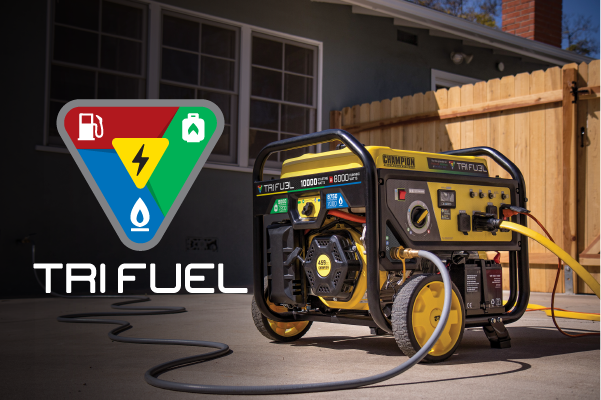
Tri fuel generators offer a versatile and reliable power solution by allowing users to switch between three different fuel sources: gasoline, propane, and natural gas. This flexibility ensures uninterrupted power supply during emergencies, outdoor activities, or off-grid living. In this article, we will explore the five best tri fuel generators available in 2024, along with their pricing, pros, and cons, to help you make an informed decision.
What is a tri fuel generator?
A tri fuel generator is a type of generator that is designed to operate on three different fuel sources: gasoline, propane, and natural gas. This versatility allows users to choose the fuel option that best suits their needs, circumstances, and fuel availability.
Tri fuel generators typically come equipped with a fuel selector switch or valve that allows users to easily switch between the different fuel sources. This flexibility is especially beneficial during emergencies or situations where a particular fuel type may be scarce or unavailable.
Gasoline is the most commonly used fuel option for tri fuel generators. It is readily available at gas stations and provides a convenient power source. Propane, also known as liquefied petroleum gas (LPG), is a cleaner-burning fuel that offers longer shelf life and reduced emissions compared to gasoline. Natural gas, on the other hand, is often sourced from utility pipelines and provides a continuous supply without the need for refueling.
The ability to use multiple fuel sources makes tri fuel generators highly versatile and adaptable. They are commonly used for various applications, including backup power during power outages, camping trips, outdoor events, construction sites, and remote locations where access to a specific fuel source may be limited.
5 Best Tri Fuel Generators
When it comes to versatile and powerful backup power, tri fuel generators are hard to beat. They can run on gasoline, propane, or natural gas, giving you flexibility in fuel options. This makes them ideal for home backup, camping, job sites, and more. We’ve researched some of the top tri fuel generator options and highlighted the main features, pros, and considerations for each:
Honda EU2200i 2200-Watt 120-Volt
The Honda EU2200i is a 2200-watt 120-volt super quiet portable inverter generator. It has a Honda GXR120 4-stroke OHV single cylinder engine and runs on gasoline with a 0.95 gallon fuel tank capacity. The EU2200i can provide up to 8.1 hours of runtime at 25% load and operates at a noise level of just 48 to 57 decibels.
Key features include electric start, eco-throttle system for efficiency, stable power output with minimal voltage fluctuation, and two 120V 20A outlets. This lightweight and compact generator weighs only 46.5 pounds and has dimensions of 20.0 x 11.4 x 16.7 inches. With its reliable performance, quiet operation, and fuel efficiency, the Honda EU2200i is ideal for RV, camping, home backup power, and worksite use. It retails for around $1,199.
Pros:
- Very quiet operation
- Fuel efficient
- Compact and lightweight design
- Stable power output
- Brand reputation for reliability
Cons:
- Expensive initial cost
- Low wattage capacity for large appliances
- No built-in fuel gauge on tank
- No electric overload protection
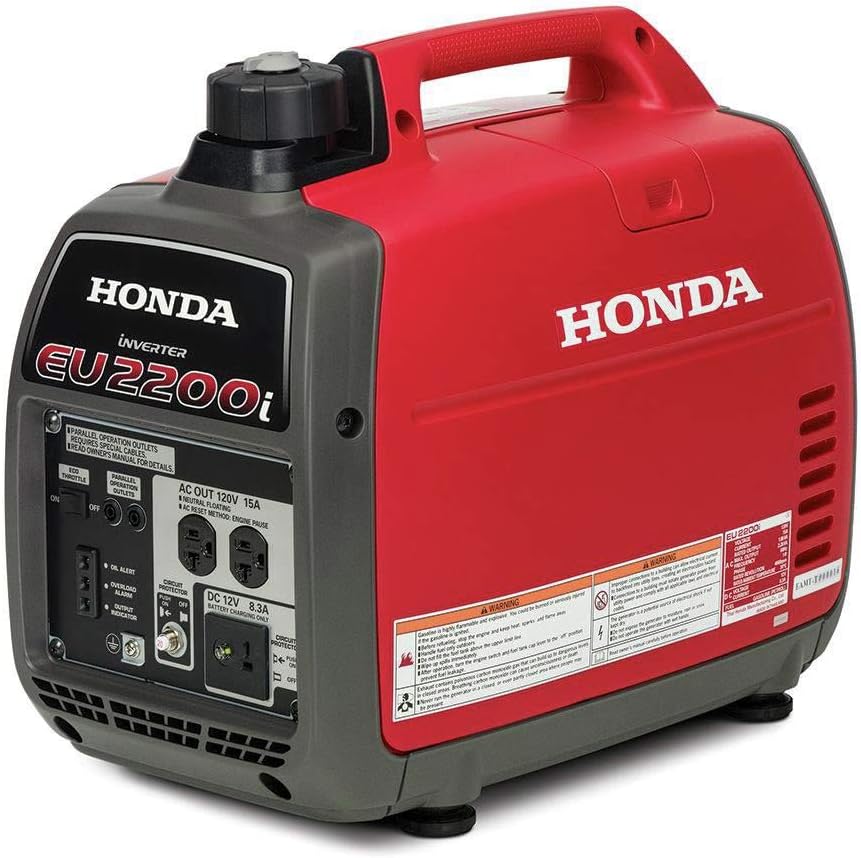
DuroMax XP12000EH Generator-12000 Watt
The DuroMax XP12000EH is a powerful dual fuel generator that delivers 12,000 starting watts and 9,500 running watts on gasoline or 10,500/8,400 watts on propane to meet high wattage needs. It runs on either gasoline with its 8 gallon tank or 20 lbs of propane, giving you fuel source flexibility.
Features include electric and recoil start, a durable steel frame with wheels and handles for portability, a digital display showing voltage/frequency/runtime, multiple 120V outlets including a 120/240V 50A outlet, and a noise rating of 69dB at 25% load. CARB compliant for all 50 states, it provides runtime of 10 hours at 50% load on gasoline. With its extreme home backup power and dual fuel operation, the XP12000EH is ideal for heavy duty home, RV, worksite, and event use. It retails for around $999.
Pros:
- Powerful 12,000 starting watt capacity
- Dual fuel versatility
- Electric and remote start options
- Digital display for voltage and runtime
- CARB compliant for all states
Cons:
- Heavy and bulky at over 200 lbs
- Expensive initial purchase price
- Can be loud when running at capacity
- Doesn’t include wheels for maneuverability
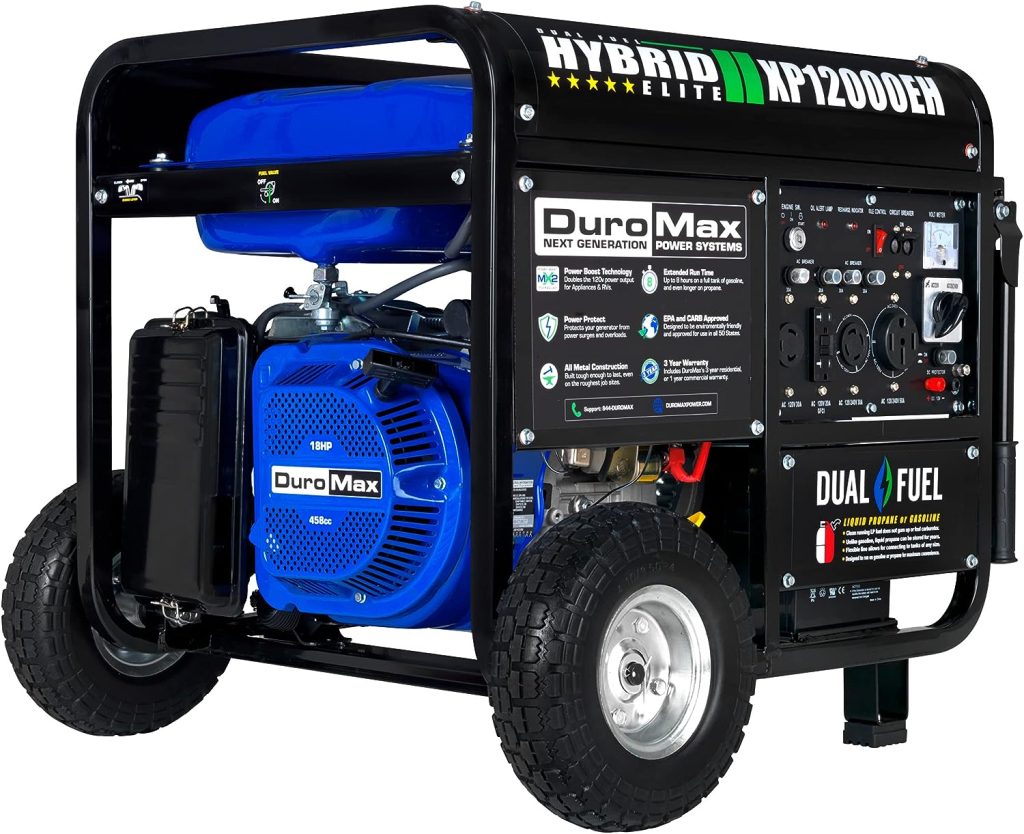
Champion Power Equipment 100416 10,000/8,000-Watt
The Champion Power Equipment 100416 is a robust portable generator that provides 10,000 starting watts and 8,000 running watts on natural gas or 9,100/7,700 watts on liquid propane. It offers tri fuel flexibility to run on either propane or natural gas, featuring electric start, a 459cc Champion engine, and CARB compliance for all 50 states.
The digital display shows voltage, frequency, and runtime, and it has outlets of 120V and 240V 50A. It includes NG and LPG conversion kits and built-in cold start technology. With CO shield monitoring, never flat wheels, and a foldable handle, the 100416 can reliably power a home during outages. Its runtime is 10 hours at 50% load on propane. With 8000 watts of power and tri fuel capabilities, this generator is ideal for whole house backup. The 100416 retails for around $1219.
Pros:
- Tri-fuel operation with NG and LPG
- Powerful 8000 running watt output
- Electric start and covered outlets
- Digital display for voltage and runtime
- CARB compliant for all states
- Includes fuel conversion kits
Cons:
- Heavy at over 200 pounds
- Expensive initial cost
- No low oil automatic shutoff
- Louder than inverter generators
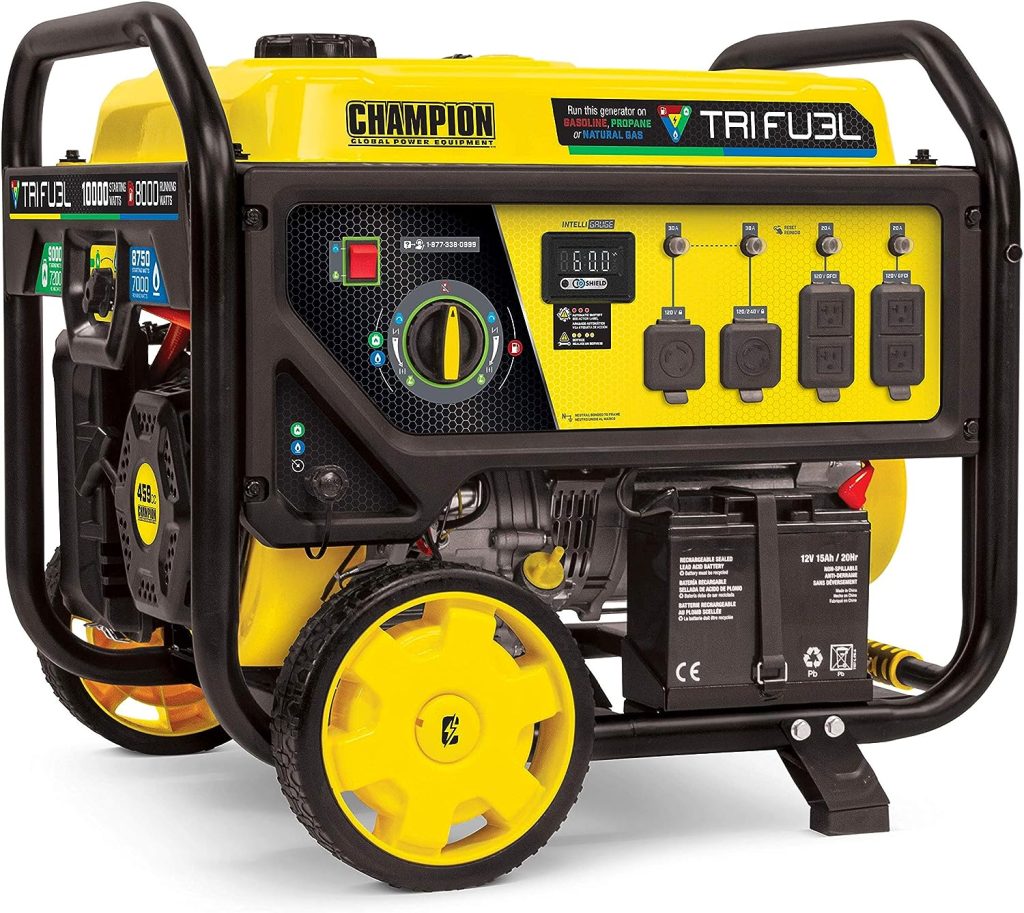
GENMAX GM10500iETC Tri Fuel Inverter Generator,10500-Watt
The Genmax GM10500iETC is a powerful tri fuel inverter generator that provides 10,500 starting watts and 8,500 running watts using gasoline, propane, or natural gas for maximum fuel flexibility. It features an EFI 457cc Genmax engine with electric start, producing clean sine wave power from the advanced inverter. The digital control panel displays voltage, frequency, and runtime stats. It comes equipped with a 30A RV outlet, 50A outlet, low oil auto shutoff, and cold start technology.
CARB compliant for all states, the GM10500iETC includes propane and natural gas hoses. The optional remote monitoring lets you control it from your smartphone. With robust output and tri-fuel capabilities, this generator is ideal for whole house backup power. The Genmax GM10500iETC retails for around $2,899.
Pros:
- Powerful 10,500 starting watt output
- Tri-fuel flexibility with gasoline, LPG, NG
- Advanced inverter for clean electricity
- Electric start and remote monitoring
- CARB compliant for all states
Cons:
- Heavy at over 260 pounds
- Doesn’t have wheels for maneuverability
- No low fuel automatic shutoff feature
- Only 1-year limited warranty
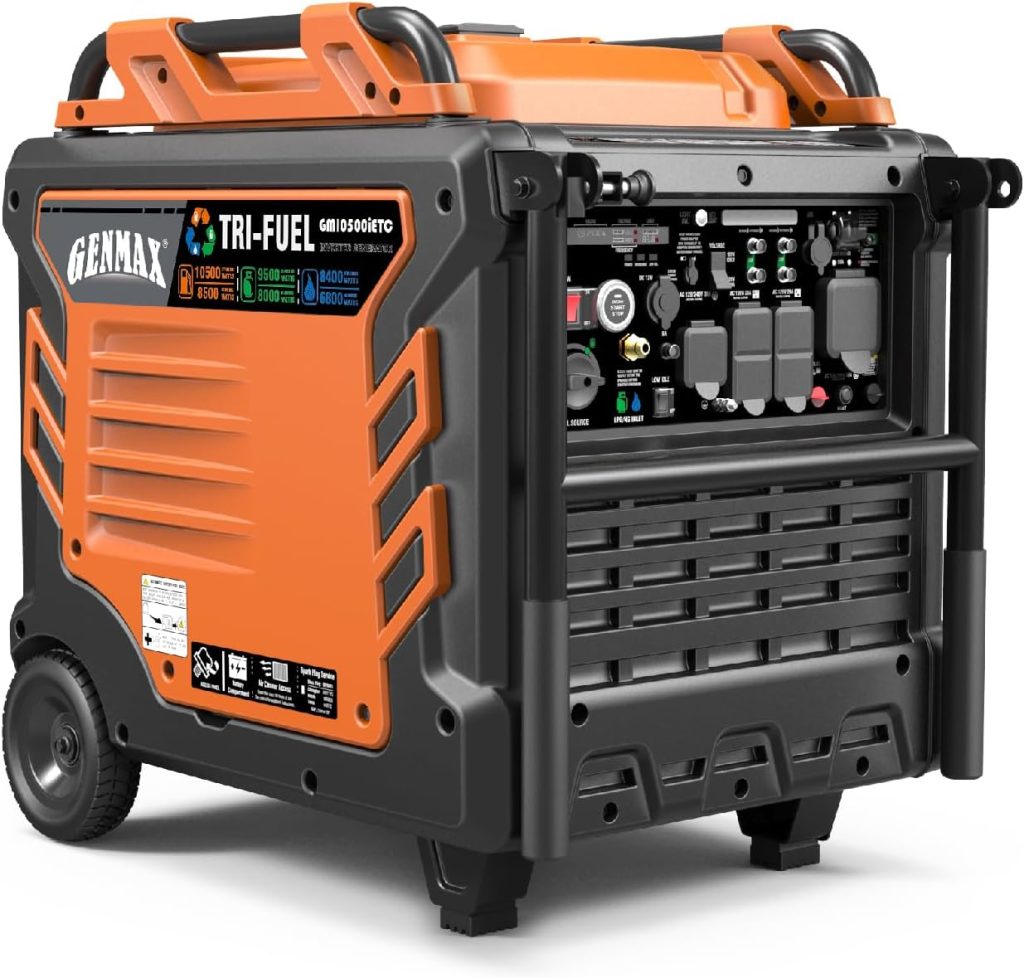
Westinghouse Outdoor Power Equipment 12500 Peak Watt
The Westinghouse 12500 Peak Watt Tri-Fuel Portable Generator provides 12500 starting watts and 10000 running watts of power using gasoline, propane, or natural gas for maximum fuel flexibility. It features remote electric start, a 457cc Westinghouse OHV engine, and a digital control panel displaying output and diagnostics. The generator is CARB compliant for all states, with cold start technology, automatic low oil shutdown, and a noise rating of 74dBA.
It comes equipped with 120V household outlets, a 120/240V 50A outlet, and is transfer switch ready. Built with a steel frame, never flat wheels, and 6.6 gallon tank, it can run for 12 hrs at 50% load. With robust 10000 running watts and tri-fuel capabilities, this model is ideal for whole house backup and portable power needs. It retails around $1,199.
Pros:
- Powerful 10000 running watt output
- Tri-fuel operation with gasoline, LPG, NG
- Remote electric start
- Digital display for voltage and hours
- CARB compliant for all states
Cons:
- Heavy at almost 250 pounds
- Can be loud when running at capacity
- No fuel level indicator on the control panel
- Requires accessories for transfer switch
- Short 2-year limited warranty
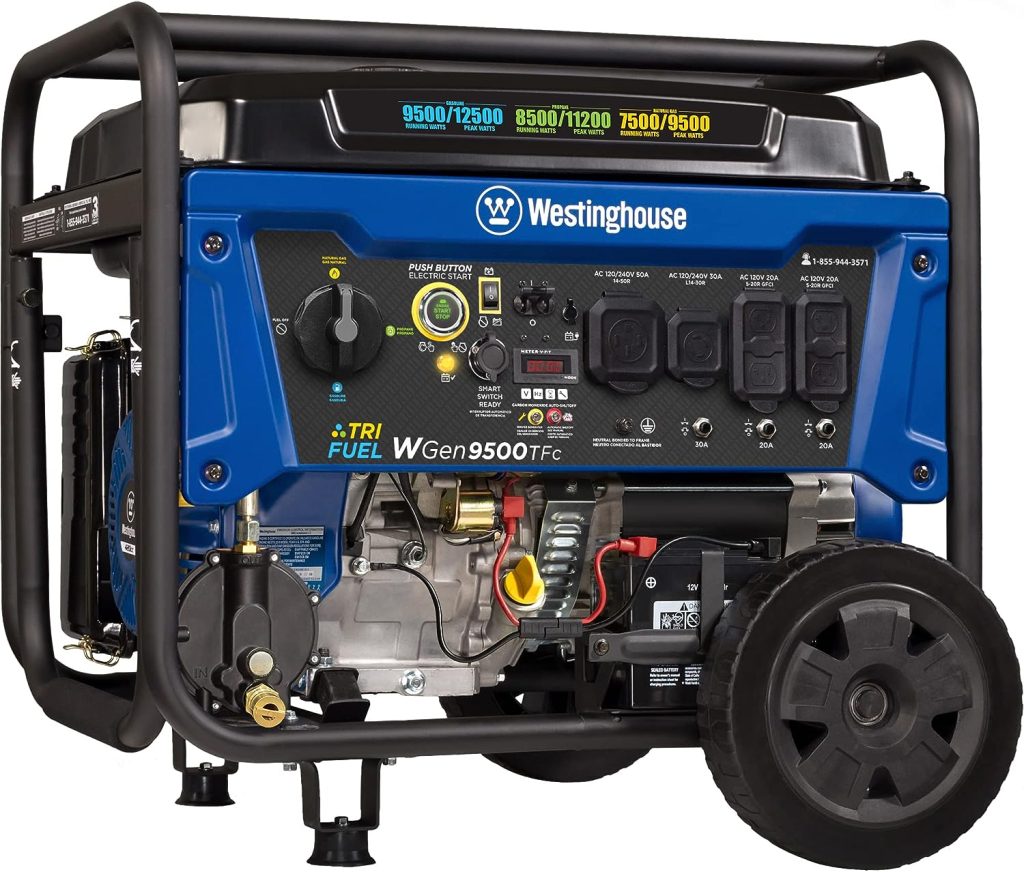
Pros of Tri Fuel Generators
Tri fuel generators offer several advantages that make them a popular choice for individuals and businesses alike. Here are some of the key pros of tri fuel generators:
- Fuel Versatility
The ability to operate on three different fuel sources (gasoline, propane, and natural gas) is a significant advantage of tri fuel generators. This versatility allows users to adapt to varying fuel availability and choose the most convenient and cost-effective option for their specific needs. It ensures a continuous power supply even when a particular fuel type is scarce or unavailable.
- Extended Run-Time
Tri fuel generators typically have longer run-times compared to single-fuel generators. By using propane or natural gas, which often have larger fuel storage capacities, these generators can provide power for extended periods without the need for frequent refueling. This is especially beneficial during prolonged power outages or situations where refueling may be challenging.
- Easy Fuel Switching
Tri fuel generators are designed with user-friendly fuel selector switches or valves that allow for seamless switching between fuel sources. Users can quickly transition from one fuel type to another without any complicated procedures or downtime. This convenience adds to the overall usability and flexibility of the generator.
- Environmental Considerations
Propane and natural gas are cleaner-burning fuel options compared to gasoline. They produce fewer emissions, reducing the environmental impact of power generation. By utilizing these cleaner fuels, tri fuel generators contribute to a greener and more sustainable power solution, particularly in environmentally sensitive areas or situations where emissions need to be minimized.
- Adaptability to Different Applications
Tri fuel generators are versatile and can be used for various applications. They are suitable for both residential and commercial use, providing reliable power during emergencies, outdoor events, construction sites, camping trips, and off-grid living. The ability to choose from different fuel sources ensures compatibility with a wide range of power needs and scenarios.
- Backup Power Reliability
Tri fuel generators are often chosen as backup power solutions due to their reliability. They offer a dependable power source during power outages, ensuring that essential appliances, medical equipment, and critical systems continue to function. The option to switch between fuel sources provides added peace of mind and ensures uninterrupted power supply when it is needed the most.
Cons of Tri Fuel Generators
While tri fuel generators offer numerous advantages, it is important to consider their potential drawbacks as well. Here are some cons associated with tri fuel generators:
- Higher Initial Cost
Tri fuel generators often come with a higher initial cost compared to single-fuel generators. The inclusion of additional components and the flexibility to operate on multiple fuel sources can increase the price of these generators. However, it is essential to weigh the upfront cost against the long-term benefits and versatility provided by tri fuel generators.
- Larger and Heavier Design
Tri fuel generators tend to be larger and heavier than their single-fuel counterparts. The inclusion of multiple fuel systems and larger fuel storage capacities can result in a bulkier and less portable generator. This can make transportation and storage more challenging, particularly if you require a generator for on-the-go or mobile applications.
- Noise Levels
Tri fuel generators, especially those running on gasoline, can produce noise during operation. While efforts have been made to reduce noise levels in modern generator models, some users may find the noise output to be relatively higher compared to other power sources. This can be a consideration, particularly in noise-sensitive environments or when using the generator in close proximity to living spaces.
- Maintenance Requirements
Tri fuel generators may require additional maintenance compared to single-fuel generators. The presence of multiple fuel systems means that each component needs to be properly maintained and serviced. This includes regular inspection, cleaning, and potential adjustments to ensure optimal performance and fuel switching functionality. It is important to follow the manufacturer’s maintenance guidelines to keep the generator in good working condition.
- Availability of Fuel Sources
While tri fuel generators provide the advantage of fuel versatility, the availability of different fuel sources can vary depending on your location. While gasoline is generally widely accessible, propane and natural gas availability may be more limited in certain areas. It is important to consider the availability and accessibility of the desired fuel sources in your region before investing in a tri fuel generator.
Despite these potential drawbacks, many users find that the benefits and flexibility offered by tri fuel generators outweigh the cons. It is crucial to carefully evaluate your specific needs, budget, and circumstances to determine if a tri fuel generator is the right choice for you.
In conclusion
Tri fuel generators provide a convenient and flexible power source, allowing users to switch between gasoline, propane, and natural gas. The five models discussed in this article offer reliable performance with their own set of pros and cons. Consider your power requirements, budget, and specific needs before making a purchase decision. Whether it’s for emergency backup power or outdoor activities, a tri fuel generator can be a valuable investment for uninterrupted power supply.
FAQ
- What is the difference between Tri-Fuel and dual fuel generators?
The main difference between tri-fuel and dual fuel generators is the number of fuel types they can run on:
1.Dual fuel generators can operate on two fuel types, usually gasoline and propane or natural gas. This gives some flexibility in fuel options.
2.Tri-fuel generators can run on three fuel types – gasoline, propane, and natural gas. This gives even more flexibility and versatility in fuel choice.
- Is a Tri Fuel Generator Right for Me?
Tri fuel generators can power entire homes but dual fuel models may be adequate for smaller needs. The extra fuel flexibility of tri fuel units comes at a higher cost. Consider your access to natural gas and propane when deciding if the cost is justified. Also factor in maintenance, transport needs, and your specific power requirements. For most homes, a dual fuel generator provides sufficient backup capability. But for large homes, available gaseous fuels, or off-grid use, a tri fuel generator may be the optimal choice.










